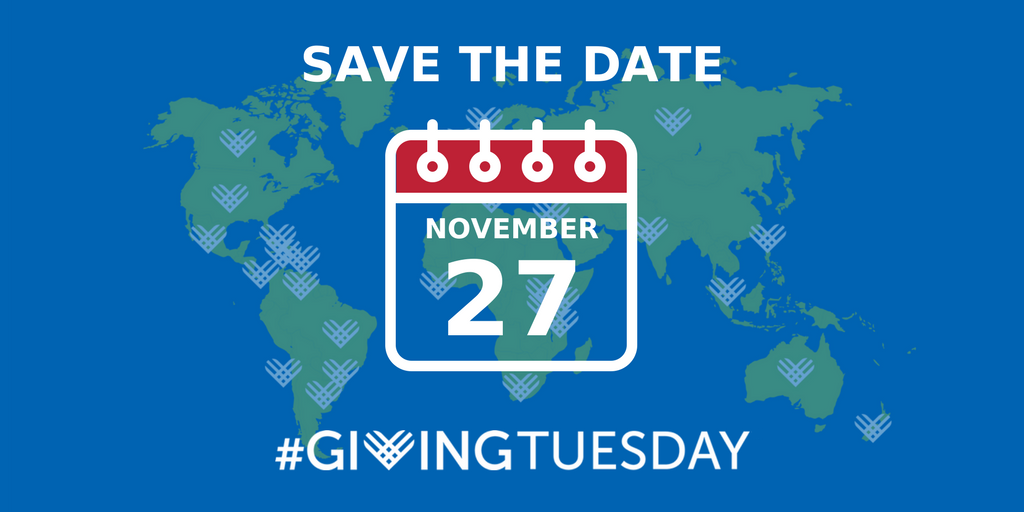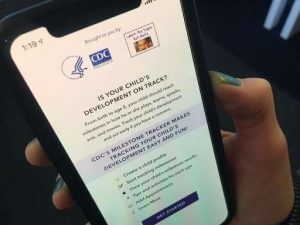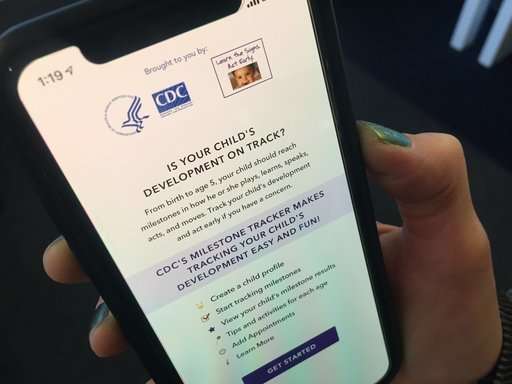The Milestone Tracker phone app from the CDC (Centers for Disease Control and Prevention) is displayed on Thursday, Nov. 22, 2018, in New York. The app was created to help parents recognize developmental delays. (AP Photo/Jenny Kane)
How many American children have autism? The U.S. government answers that question at least three different ways and says the latest estimate—1 in 40 kids—doesn’t necessarily mean the numbers are rising.
The new number, published Monday in Pediatrics, is from one of three periodic surveys the government uses to assess autism rates. It’s higher than a different survey’s estimate published earlier this year, but the surveys use different methods and measure different populations of kids so the results aren’t really comparable.
Because there’s no medical test, “autism spectrum disorder is a particularly challenging condition to track,” government researchers wrote in the Pediatrics report.
The true occurrence of autism likely ranges from about 1 in 59 kids to 1 in 40 kids, researchers say, taking into account information from all three surveys.
“All contribute different information to form a fuller picture,” said Michael Kogan, lead author of the new report conducted by the U.S. Health Resources & Services Administration, a federal agency.
Various reports in recent years have suggested autism rates are rising slightly. Experts think that’s mostly because of earlier diagnosis, an expanded definition and more awareness, but say they can’t rule out a true increase caused by unknown factors.
Here’s a rundown on the three surveys:
— The latest estimate is based on responses from about 43,000 parents of kids aged 3 to 17. They were asked if their child had ever been diagnosed with autism spectrum disorder, the formal name that encompasses mild to severe cases. The 2016 survey was internet-based; earlier ones were telephone surveys showing slightly higher rates but the researchers say the results aren’t comparable,
The nationally representative survey suggests that about 1.5 million U.S. kids have autism—2.5 percent or 1 in 40.
— The Centers for Disease Control and Prevent collects nationally representative information from in-person interviews. In 2016, it also asked parents of kids aged 3 to 17 about an ever-diagnosis of autism and came up with a rate slightly higher than in previous years but similar to the 1 in 40 estimate.
— The CDC also uses an 11-state tracking system. It’s based on health and school records showing which kids meet criteria for autism, focusing on 8-year-olds because most cases are diagnosed by that age. A report from this network released in April, showed that 1 in 59 kids have autism although much higher rates were found in some places. This estimate is considered the most rigorous, but it’s not nationally representative.
Autism Speaks, an advocacy group, is among organizations that use the CDC’s network estimate. It tends be more conservative and potentially more accurate than parents’ reports, said neuroscientist Dean Hartley, a senior director for the group,
Autism is a developmental disorder that can involve varying degrees of language and social impairments, often including repetitive behaviors.
Experts say affected kids fare best with early diagnosis and treatment, but some doctors may dismiss early signs and some parents may be unaware of autism symptoms, the CDC’s Dr. Stuart Shapira said.
The Pediatrics survey found that about one-third of kids with parent-reported autism received no behavior treatment and showed that many parents had trouble getting services for their children, echoing earlier studies.
Shapira noted the agency has a free Milestone Tracker phone app to help parents recognize developmental delays.
This news was posted by Lindsey Tanner on November 26, 2018
https://medicalxpress.com/news/2018-11-kids-autism-ways.html
Related news:
https://www.washingtonautismadvocacy.org/updates/2018/10/01/autism-prevalence-program-expands-to-include-teenagers/
Ongoing WAAA Event:
Friendship Matters!
http://www.washingtonautismadvocacy.org/updates/advocacy/friendship-matters/
For registration, please email Fanta Cora <fanta@washingtonautismadvocacy.org>.
GivingTuesday
For more information, please follow up with WAAA’s upcoming social media posts!




